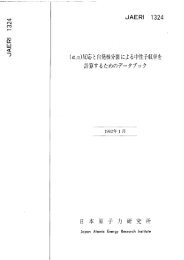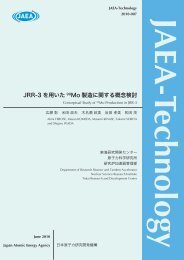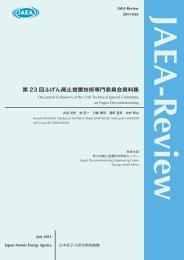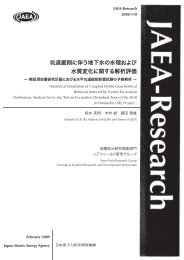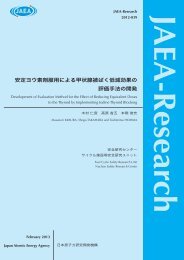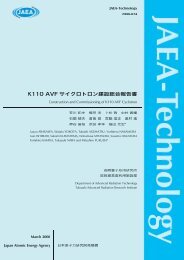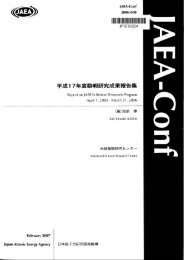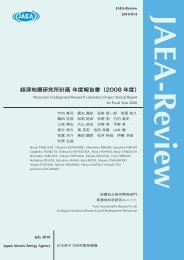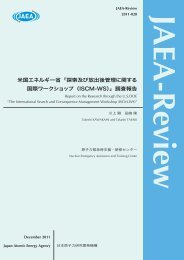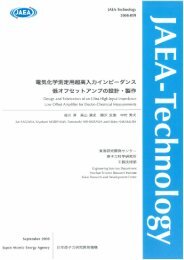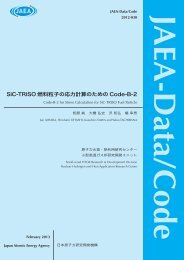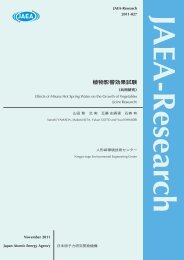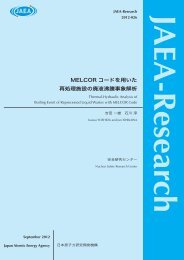JAEA-Conf 2011-002 - 日本原子力研究開発機構
JAEA-Conf 2011-002 - 日本原子力研究開発機構
JAEA-Conf 2011-002 - 日本原子力研究開発機構
You also want an ePaper? Increase the reach of your titles
YUMPU automatically turns print PDFs into web optimized ePapers that Google loves.
The Institute's staff of about 280 (150 of them are scientific researchers) works in 16<br />
laboratories, 2 scientific experimental facilities and 9 departments providing general support<br />
activities. Since 2005 nearly half of all laboratories in INRNE qualified for QQS certificate<br />
for Quality Management System ISO 9001:2000 and for Environmental Management System<br />
ISO 14001:2004. The main topics of activities include:<br />
Theory of the elementary particles, fields and atomic nuclei<br />
Nuclear physics and astrophysics<br />
High energy physics<br />
Nuclear methods<br />
Nuclear instrumentation<br />
Radiochemistry<br />
Dosimetry and radiation safety<br />
Neutron physics<br />
Reactor physics<br />
Nuclear energy and nuclear safety<br />
Monitoring and management of environment<br />
The INRNE has a programme accreditation from the National Evaluation and<br />
Accreditation Agency for Doctor's degree in six different areas of theoretical and<br />
mathematical physics, nuclear physics, physics of elementary particles and high energies,<br />
neutron physics and physics of nuclear reactors, radiochemistry and nuclear reactors. The<br />
Institute has collaboration agreements with the Faculty of Physics of Sofia University “St.<br />
Kliment Ohridski”, South-West University “Neofit Rilski” (Blagoevgrad), American<br />
University in Bulgaria (Blagoevgrad), Konstantin Preslavsky University of Shoumen,<br />
Technical University (Sofia) and University of Mining and Geology “St. Ivan Rilski” (Sofia).<br />
2. Recent state of INRNE<br />
In 2009 INRNE has undergone an independent, comprehensive and detailed review from<br />
the ESF and ALLEA on the base of self-evaluation report provided by the Institute for the<br />
period 2004-2008. For the purposes of this evaluation, and given the very wide breadth and<br />
heterogeneity of activities carried out at INRNE and the complexity of the institute, it was<br />
decided to divide INRNE into the following three units:<br />
Unit 1: Theoretical and experimental nuclear and particle physics and astrophysics, including<br />
mathematical theory<br />
Unit 2: Applications<br />
Unit 3: Facilities<br />
The corresponding scores according to three criteria considered by the Science Review<br />
Committee are as follow:<br />
Quality and<br />
Productivity<br />
<strong>JAEA</strong>-<strong>Conf</strong> <strong>2011</strong>-<strong>002</strong><br />
Relevance: Socioeconomic<br />
Impact<br />
Prospects<br />
Unit 1 A A A<br />
Unit 2 B A B<br />
Unit 3 B A B



